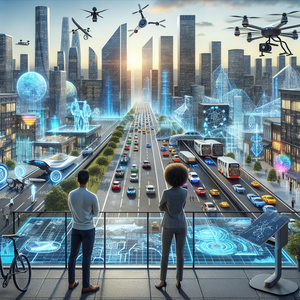
Top Careers in Autonomous Vehicles and Smart Mobility: Driving the Future of Transportation
The autonomous vehicles (AV) and smart mobility industry is revolutionizing the way we think about transportation. It merges artificial intelligence, robotics, urban planning, and sustainability to redefine how people and goods move. With the potential to generate $300-$400 billion in revenue by 2035, according to McKinsey, this field offers immense career opportunities for those ready to innovate. However, the road to full adoption is not without challenges, including regulatory complexities, technological hurdles, and consumer acceptance. This blend of growth and uncertainty creates a dynamic landscape, ripe for professionals eager to make a difference. This article explores key careers in the AV and smart mobility space, providing insights into the responsibilities, qualifications, and contributions of various roles. Whether you're a tech enthusiast, an urban designer, or a policymaker, you'll discover how your expertise can help shape the future of transportation.
Job Summaries:
Autonomous Vehicle Software Engineer:
- Develop and refine algorithms that enable autonomous vehicles to navigate safely and efficiently.
- Integrate sensor data (LiDAR, radar, cameras) and ensure compliance with safety standards.
- Demonstrate proficiency in machine learning, programming languages like Python and C++, and have a background in computer science or robotics.
- Create the "brains" of AVs, allowing them to make real-time decisions on the road.
Sensor Fusion Specialist:
- Combine data from multiple sensors to ensure AVs can perceive their environment accurately.
- Tasks include designing integration algorithms and troubleshooting hardware-software interactions.
- Skills required include expertise in signal processing, electrical engineering, or robotics.
- Sensor fusion enables autonomous vehicles to detect and respond to their surroundings with precision, making them safer and more reliable.
Smart Mobility Data Analyst:
- Analyze urban infrastructure, traffic patterns, and consumer behavior to design efficient transportation systems.
- Skills required include proficiency in SQL, Python, and data visualization tools, with a background in data science or urban planning.
- These insights drive smarter and more sustainable urban mobility solutions.
Vehicle-to-Infrastructure (V2I) Communication Specialist:
- Develop systems that allow vehicles to communicate with road infrastructure, ensuring seamless integration and cybersecurity.
- Skills required include knowledge of IoT technologies, telecommunications, and computer science.
- V2I specialists create connected ecosystems that improve traffic flow and safety.
Autonomous Vehicle Test Driver:
- Test AVs under various conditions
- Monitor their performance
- Provide feedback to development teams
- Skills required include a commercial driver’s license
- Familiarity with AV systems
- Test drivers play a critical role in ensuring vehicles are safe before public deployment
Urban Mobility Planner:
- Design infrastructure to support AVs, optimize traffic patterns, and integrate sustainable solutions into urban environments.
- Skills required include a background in urban planning, civil engineering, or transportation studies.
- Mobility planners create AV-compatible cities, paving the way for smarter, greener transportation networks.
Machine Learning Engineer for Autonomous Systems:
- Build and optimize AI models that enable AVs to make real-time decisions, such as obstacle avoidance and route planning.
- Skills required include expertise in TensorFlow, PyTorch, and a strong foundation in AI or computer science.
- These engineers push the boundaries of what AVs can achieve.
Intelligent Automation Specialist:
- Use AI and robotics to automate tasks like route optimization, predictive maintenance, and fleet management.
- Skills required include a background in mechatronics, robotics, or artificial intelligence.
- Automation specialists enhance the efficiency of transportation systems, reducing costs and improving reliability.
Cybersecurity Analyst for Autonomous Vehicles:
- Protect AV systems from cyber threats by identifying vulnerabilities, developing security protocols, and monitoring networks.
- Skills required include expertise in encryption, cybersecurity standards like ISO 21434, and computer science.
- With connected systems at risk of hacking, cybersecurity analysts ensure consumer trust and safety.
AV Policy Advisor:
- Collaborate with governments, companies, and stakeholders to draft policies that regulate and promote AV adoption.
- Skills required include a background in public policy, law, or transportation studies.
- Policy advisors ensure innovation aligns with ethical, legal, and safety standards.
Smart City Integration Specialist:
- Develop strategies to integrate autonomous and connected vehicles into smart city ecosystems.
- Skills required include a degree in urban studies, engineering, or public administration.
- They bridge the gap between futuristic technology and urban living.
The autonomous vehicles and smart mobility industry is brimming with opportunities for those ready to innovate. From designing cutting-edge AI systems to drafting policies that govern their use, every role contributes to shaping the future of transportation. While challenges like regulatory hurdles and public skepticism remain, the potential rewards—both economic and societal—are immense. If you're passionate about technology, sustainability, and urban development, now is the time to explore a career in this transformative sector. Whether you're creating smarter cities, building safer vehicles, or developing user-friendly interfaces, your work will propel the mobility revolution forward. The future of transportation is being written now—are you ready to be a part of it?
Explore More Jobs

